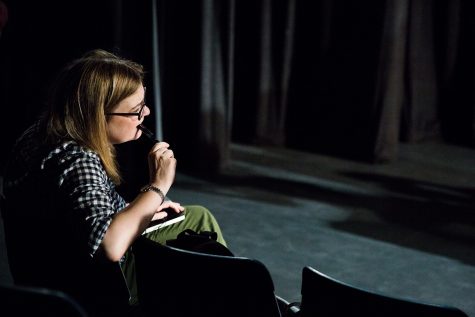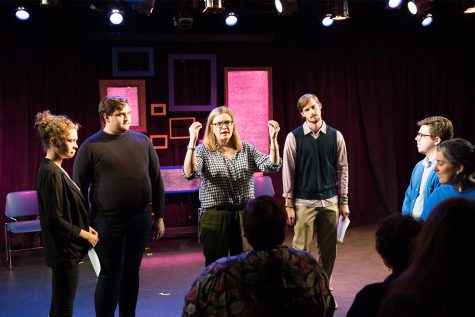The show must go on for Columbia’s theatre classes and shows
This article is part of the Chronicle’s series “Difficult to Transfer” in which we explore how departments are transitioning arts-based courses online due to the coronavirus, or COVID-19, pandemic.

Theatre students turn to online spaces to salvage canceled productions as their classes also move online in the coronavirus-induced digital age.
On her phone, Claire McConnell keeps a list of cabaret ideas. Last semester, she planned to make one of them a reality by creating a cabaret concert that uses only hit songs by the Swedish supergroup ABBA.
Shortly after McConnell, a sophomore musical theatre performance major, began her independent project that was set to debut on April 23, Columbia sent out an email informing students that in-person classes were suspended until April 6 and campus events would be canceled until further notice.
It eventually became clear there would be no more in-person classes or events the rest of the semester.
“When we got the email, we knew it was coming,” McConnell said. “It was not that much of a shock.”
Theatre courses
As part of Columbia’s online transition, Carin Silkaitis, the Allen and Lynn Turner chair of the Theatre Department, said instructors in the department have found ways to make online versions of their classes feel as realistic as possible.
“Because we are in the situation we are in, we have had to think outside of the box,” Silkaitis said.
Freshman musical theatre major Nicole Holahan’s dance professor had already begun recording classes before Columbia closed, Holahan said. The only assignment she was worried about was for a foundations class.
“Our teachers want us to record [our group] acting out a scene through Zoom and then upload it,” Holahan said. “I do not really know how that is going to work because I have to be physical with [my scene partner] and hug her and show loving affection.”
Khalid Long, an assistant professor in the Theatre Department, is teaching two courses while assisting other professors with the move to online learning. It can be a trying process, Long said, but Columbia has been supportive.
“All of us as a community, we banded together to assist one another,” Long said. “It has been a smooth transition with minimal hiccups.”
For his classes, Long has been assigning readings and discussions for nearly 200 students. Because of that, the two-week pause was appreciated, he said.
“It gave me, along with my colleagues, time to really assess and figure out how we were going to move forward on teaching remotely,” Long said. “For me, I used that time to dig in and give me time to really research and pull together other materials to address and circulate around the plays that were scheduled. But it also gave me time to reflect on what it was I was attempting to do in this class.”
Senior acting major Viridiana Márquez said adjusting to classes online was difficult at first, but she has since adjusted.
“I feel like my professors have been really great,” Márquez said. “During the break, they definitely worked hard to create a curriculum for the rest of the semester to make it easy for us, and also educational enough, so we could get what we originally wanted as learning outcomes from the class.”
Even though Márquez is upset this is how her school career has concluded, she said she still has the memories from the last four years and views the situation as a new challenge, she said.
“For actors, you need to be out on sets or in theatres filled with an audience,” Márquez said. “So, it’s definitely something that may cause difficulty for us.”

Theatre productions
When student productions such as “Urinetown” were canceled on campus as part of preventative measures against the spread of the coronavirus, Silkaitis saw “theatre magic” from students involved in the production because even though students knew they could not invite their parents, they continued to put on a final tech rehearsal.
“Those students stuck through it and kept tech-ing their show up until the last night that they were allowed in the building,” Silkaitis said. “Every single student, every single design student, they kept working and working their bottoms off. I saw so much heart and so much soul and so much love watching those students, technicians and designers.”
Similarly, McConnell decided she needed to figure out how to move forward with her show, “C[ABBA]ret.”
McConnell decided to salvage her production by using a similar method to how she had gone about the casting and rehearsal process—by going virtual.
The current plan for the project is to create a video of all the cast members singing and edit it together in a grid style similar to that of a Todrick Hall video. She hopes to have the video finished by May 10.
Silkaitis has seen other students adapt to the new situation by planning to finish performances virtually.
“That’s exactly what we should be doing,” Silkaitis said. “If there is a way to continue doing your work and you are excited about it, you should continue doing your work.”
McConnell said the move to working virtually may even be easier because the production does not have to work around people’s schedules.
Much like how McConnell asked for auditions to be sent in virtually, self-taped auditions have become the new normal for actors, said Silkaitis, who is also an actor and who said she has auditioned more through virtual means than in-person as the industry is becoming more digitized.
“One thing that has come as a result of this health crisis in our country is we are able to introduce our students to the realities of the industry in a way that maybe we did not lean on as much,” Silkaitis said. “It gives our students access to what a professional actor is really having to deal with these days.”

